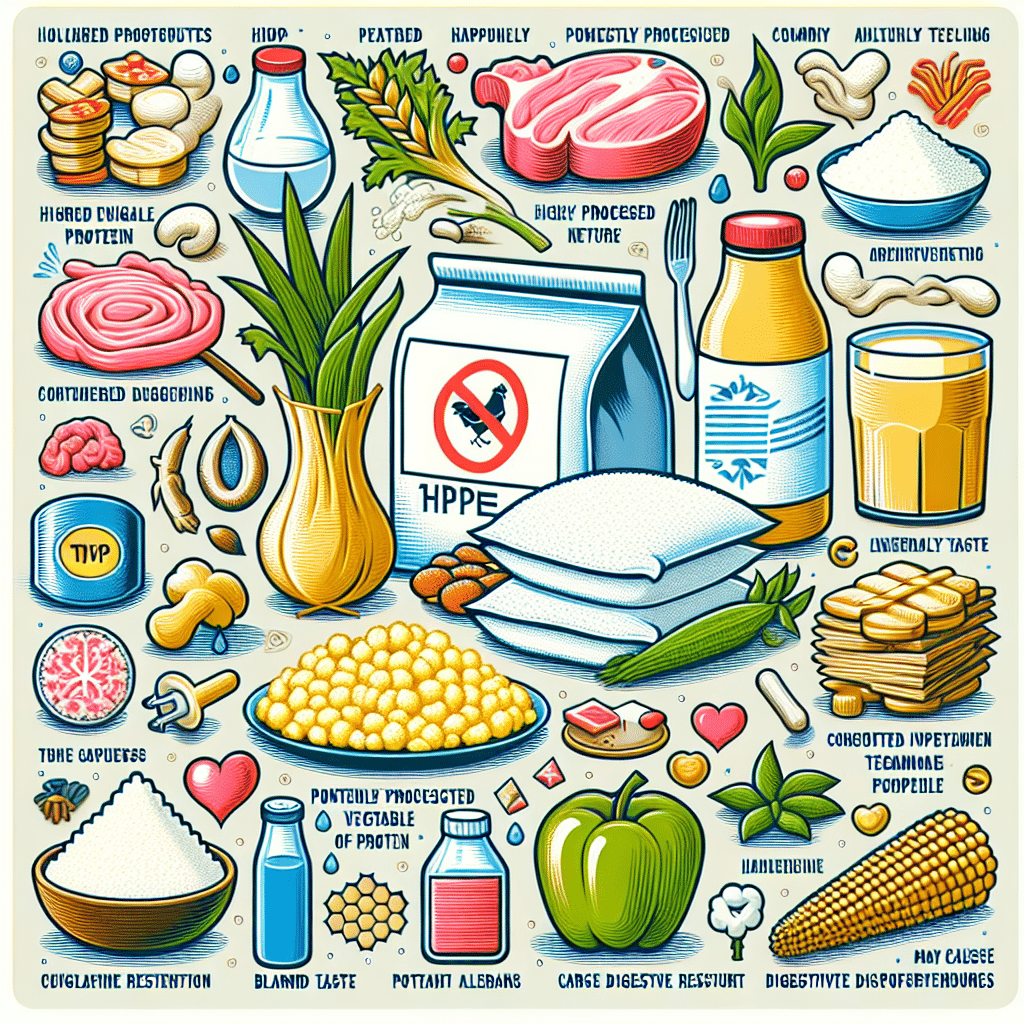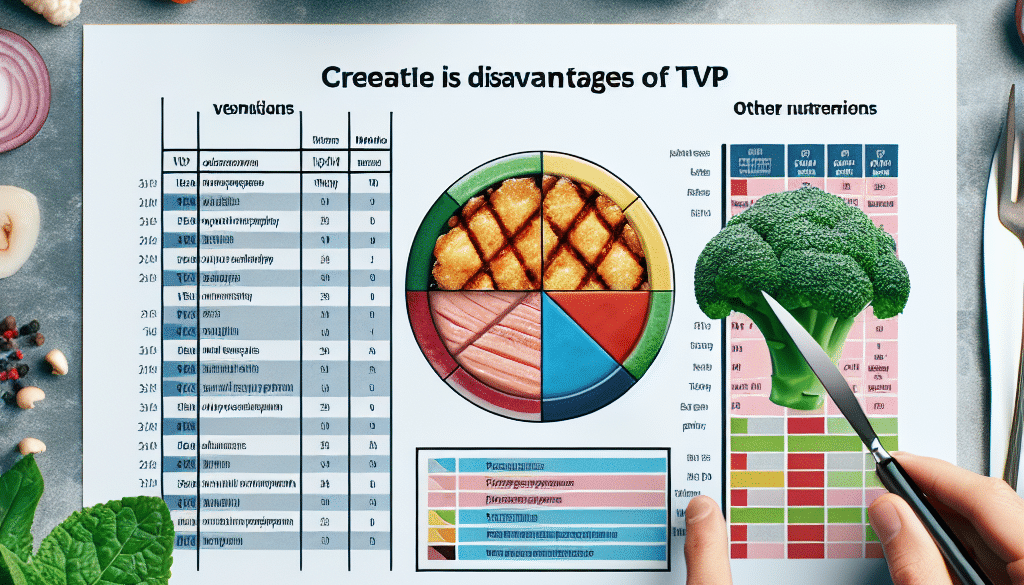What Are The Disadvantages Of TVP?
-
Table of Contents
- Understanding the Disadvantages of Textured Vegetable Protein (TVP)
- Health Concerns Linked to TVP Consumption
- Environmental Impact of TVP Production
- Consumer Preference and Sensory Issues
- Nutritional Limitations of TVP
- Economic and Social Considerations
- Conclusion: Weighing the Pros and Cons of TVP
- Discover ETprotein’s High-Quality Protein Products
Understanding the Disadvantages of Textured Vegetable Protein (TVP)

Textured Vegetable Protein (TVP) is a highly versatile food product derived from soybeans. It is often used as a meat substitute or meat extender due to its rich protein content and meat-like texture. While TVP has gained popularity among vegetarians, vegans, and those looking to reduce their meat consumption, it is not without its disadvantages. This article explores the various drawbacks associated with TVP, providing a comprehensive understanding of its potential impacts on health, the environment, and consumer preferences.
Health Concerns Linked to TVP Consumption
One of the primary concerns surrounding TVP is its potential health implications. Despite being a plant-based protein source, TVP is a highly processed food product, which raises several health-related issues.
- Allergenic Potential: As a soy product, TVP can be problematic for individuals with soy allergies. Soy is one of the eight major allergens, and consuming TVP could trigger allergic reactions in sensitive individuals.
- Phytoestrogen Content: Soy contains phytoestrogens, which are plant compounds that can mimic the hormone estrogen in the body. While the health effects of phytoestrogens are still debated, some studies suggest that excessive consumption could have hormonal implications.
- Hexane Extraction: The process of isolating soy protein to make TVP often involves the use of hexane, a neurotoxic chemical solvent. Residual hexane in TVP raises concerns about long-term health effects, although the FDA considers the levels in processed foods to be negligible.
- MSG and Additives: Some TVP products may contain added flavors, including monosodium glutamate (MSG), to enhance taste. MSG and other additives can cause adverse reactions in sensitive individuals and contribute to the overall processed nature of the product.
Environmental Impact of TVP Production
The production of TVP also has environmental implications that are worth considering. Soy cultivation, which is the basis for TVP, can have significant environmental consequences.
- Deforestation: The expansion of soy plantations has been linked to deforestation in countries like Brazil. This not only destroys habitats but also contributes to climate change.
- Pesticide Use: Soy crops are often genetically modified to resist herbicides, leading to increased use of these chemicals. Pesticide runoff can contaminate water supplies and harm wildlife.
- Monoculture Farming: Large-scale soy production typically involves monoculture practices, which can deplete soil nutrients and reduce biodiversity.
Consumer Preference and Sensory Issues
Despite its functional properties, TVP may not always meet consumer expectations in terms of taste, texture, and overall eating experience.
- Flavor Profile: TVP is often criticized for its bland taste, requiring additional seasoning and flavoring to make it palatable.
- Texture Differences: While TVP can mimic the texture of ground meat, it may not satisfy all consumers, particularly those who are accustomed to the taste and texture of real meat.
- Limited Culinary Uses: TVP is versatile but may not be suitable for all types of dishes, especially those that rely on the specific qualities of meat.
Nutritional Limitations of TVP
Although TVP is a good source of protein, it may lack the nutritional complexity of whole foods.
- Reduced Nutrient Profile: The processing of soy to create TVP can strip away some of the natural nutrients found in whole soybeans.
- Imbalanced Amino Acid Profile: While soy protein is considered complete, the balance of amino acids in TVP may not be ideal for all dietary needs.
- Lack of Variety: Relying heavily on TVP for protein can lead to a lack of dietary diversity, which is important for obtaining a range of nutrients.
Economic and Social Considerations
The production and consumption of TVP also have economic and social dimensions that should not be overlooked.
- Impact on Traditional Farming: The rise of industrial soy production for TVP and other products can undermine traditional farming practices and local economies.
- Food Security Concerns: The global demand for soy can drive up prices, affecting the availability and affordability of soybeans for populations that rely on them as a staple food.
Conclusion: Weighing the Pros and Cons of TVP
In conclusion, while TVP offers benefits as a plant-based protein source, it is important to consider its disadvantages. Health concerns, environmental impact, consumer preferences, nutritional limitations, and economic and social considerations all play a role in assessing the suitability of TVP in one’s diet. As with any food product, moderation and variety are key to a balanced and sustainable diet.
Discover ETprotein’s High-Quality Protein Products
If you’re looking for alternative protein sources that address some of the concerns associated with TVP, ETprotein offers a range of organic bulk vegan proteins that are non-GMO and allergen-free. Their products, including Organic rice protein, clear rice protein, pea protein, and more, provide a neutral taste and cater to various industries. For those interested in the antioxidant properties of proteins, ETprotein also supplies L-(+)-Ergothioneine (EGT) in various grades suitable for nutraceutical, pharmaceutical, and cosmetic applications.
About ETprotein:
ETprotein, a reputable protein and L-(+)-Ergothioneine (EGT) Chinese factory manufacturer and supplier, is renowned for producing, stocking, exporting, and delivering the highest quality organic bulk vegan proteins and L-(+)-Ergothioneine. They include Organic rice protein, clear rice protein, pea protein, clear pea protein, watermelon seed protein, pumpkin seed protein, sunflower seed protein, mung bean protein, peanut protein, and L-(+)-Ergothioneine EGT Pharmaceutical grade, L-(+)-Ergothioneine EGT food grade, L-(+)-Ergothioneine EGT cosmetic grade, L-(+)-Ergothioneine EGT reference grade and L-(+)-Ergothioneine EGT standard. Their offerings, characterized by a neutral taste, non-GMO, allergen-free attributes, with L-(+)-Ergothioneine purity over 98%, 99%, cater to a diverse range of industries. They serve nutraceutical, pharmaceutical, cosmeceutical, veterinary, as well as food and beverage finished product distributors, traders, and manufacturers across Europe, USA, Canada, Australia, Thailand, Japan, Korea, Brazil, and Chile, among others.
ETprotein specialization includes exporting and delivering tailor-made protein powder and finished nutritional supplements. Their extensive product range covers sectors like Food and Beverage, Sports Nutrition, Weight Management, Dietary Supplements, Health and Wellness Products, and Infant Formula, ensuring comprehensive solutions to meet all your protein needs.
As a trusted company by leading global food and beverage brands and Fortune 500 companies, ETprotein reinforces China’s reputation in the global arena. For more information or to sample their products, please contact them and email sales(at)ETprotein.com today.














